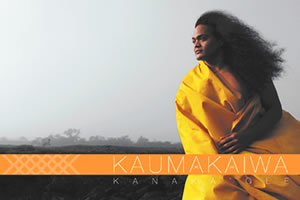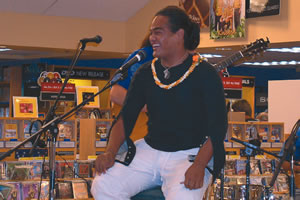Kaumakaiwa Kanaka’ole

The 411
Born into a legacy of Hawaiian culture ambassadors, Kaumakaiwa Kanaka’ole has dedicated his life to perpetuating and maintaining the traditions of his family.
As the son of Kekuhi Kanahele, the grandchild of Pualani Kanaka’ole, great-grandson of Edith Kanahele Kanaka’ole and great-great-grandson of Mary Keali’ikekuewa, Kaumakaiwa is deeply rooted in Hawaii’s history of hula, language and music.
Their halau, Halau O Kekuhi, has provided Kaumakaiwa his first steps into the realm of performance and art. At just 26 years old, he already has 14 years of Merrie Monarch experience, has released three albums, earned three Na Hoku Hanohano awards and is well on his way to pursuing a master’s degree in Hawaiian studies with an emphasis in performing arts at UH-Manoa.
Album No. 3 is a self-titled project that broadened his reach beyond the movements, the oli (chant) and the mele (song). Here he challenges himself to bring his music to a global audience and raise the bar for Hawaiian music.
“I decided to give it a self-titled feature, because after you’ve executed so many things you need to personalize it, so instead of working outward you work more inward,” says Kaumakaiwa, who was born, raised and resides in Hilo.“In retrospect, this third album is an ode to the people who have contributed to my growth as an artist. I think all my albums have been personal, but it does make it more personal because it bears my name more blatantly. Moreover, it’s the most mature album in terms of my vocal abilities and music selections. It’s a testament not just to my person, but all the people and knowledge involved.”
A natural progression from his sophomore album, Kaumakaiwa presents a generational piece that connects his past to his present and future. It’s the message of ancestral knowledge and the kuleana (responsibility) he gladly accepts that resounds through the album.
“The poetry, metaphors and Hawaiian language I used are older, because I fashioned more to chants and what people coined as hula kahiko (ancient) - that was my influence,” says Kaumakaiwa. “Just sort of taking that old presence and presenting it in a newer vehicle through music. As far as the music is concerned, it’s what the world will call progressive, but it’s still familiar.”
As old becomes new and the new becomes old, Kaumakaiwa has taken his place in the cycle.

|
Q’nA
Aside from your family, who has been influential in your music and your life?
That’s interesting, because I’ve only been with family. As far as my creative inspirations are concerned, those are completely family-based and family-oriented. My grandmother Pua is definitely the matriarch of the family. My mother is my biggest inspiration. I’ve watched her and she has prompted me to speak out. You know what, though? This is going to sound really funny, but Tina Turner has been influential. It’s her performance ability. The tradition we come from is from Pele and fire, and you see that tenacity in her and her fearlessness. And her energy level on stage is uncanny. She kind of reminds me of my mom, actually. And even the neo-soul movement, people like Indie Irie. Even people like Amy Winehouse, without the drugs.
Was performing and singing something that you’ve always wanted to do?
Oh, no. Thanks to my grandma Pua, there were no expectations. She taught me to live in the present. What happened happened, and things that are meant to be will be. The hula tradition was always there and still is. We’re going on year 19 in our halau. That’s a large portion of my life.
How do you think you’ve changed and evolved through the years?
I’ve come to own and respect my own divinity. Everyone is divine in their own right. I think that’s what the performance aspect has given me. Although I’ve been raised through the halau and performance is nothing new to me, performing as a solo vocalist is a completely new arena. That afforded me growth, as far as inward personality and my character. It even taught me to be a better human being almost, because in the first five minutes that you’re standing on stage you have to be able to draw all of those different personalities and characters in and tap into every single one of them. It almost heightens your humanity that way. It taught me a lot about relatability and being able to truly appreciate that connection.
What’s your favorite song to perform?
It’s a song that my mom wrote, called Don’t Cry Oe. And it’s a song from her first album. It’s simple; it’s only two chords, but the progression. Short story: The song was written by my stepfather to her as a gift as a testament to their love. The tune and melody that my mother put to it was a melody from my great-grandmother Edith’s album, which was a melody from a lullaby that she wrote for my mom’s brother. And that melody my great-great-grandmother used to hum to my great-grandmother. And so I heard that, and I actually took that tune and made a hybrid of it and used it for my debut album. That same tune that is now five generation old. I received my first Hoku with that song. So that’s my favorite song to sing and that’s not even my song. The tune is an heirloom and it’s a testament that old becomes new.
What are your goals both on and off the stage?
I’m very aware of my past and who I come from. As for my future, I think it will come. I’m not all that concerned with what will or will not happen. What has happened and is happening is amazing, so I can only imagine. In the next five years, before I’m 30, I would love to become a world artist, truly. I would love to be catapulted into that realm. I want to go past popular music and mainstream, and I want the world to hear Hawaiian music for what it is from a Hawaiian language speaker raised in Hawaiian culture of Hawaiian ancestry.
E-mail this story | Print this page | Comments (0) | Archive | RSS Comments (0) |
Most Recent Comment(s):





 Del.icio.us
Del.icio.us








